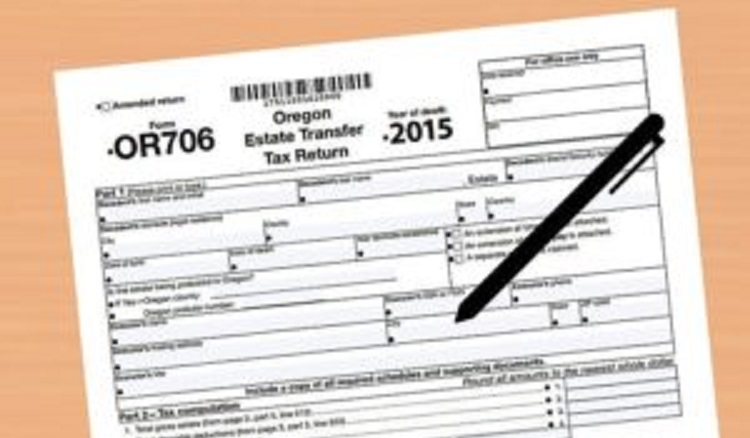When a decedent who owned over $1,000,000 in assets passes away and all of his or her assets pass via beneficiary designations and not through the normal channels of estate administration, such as probate or trust administration, the Oregon Estate Transfer Tax Return (OR706) may slip through the cracks. This can result in hefty tax penalties and interest. But how does the Oregon Department of Revenue know whether an OR706 should have been filed? Who is liable for the taxes?
It is easiest to use an illustration to walk through this complicated situation. Imagine a 95-year-old widow with four children living in Oregon. At her age, she probably has sold her home and placed the proceeds into a brokerage account. She may even have a retirement account and several pay-on-death accounts. It is likely that she has named all her children as equal beneficiaries on these accounts. If she is fortunate enough to have over $1,000,000 in assets at the time of her death, then an Oregon Estate Transfer Tax Return (OR706) must be filed and the resulting taxes must be paid. But who is responsible for paying them?
In a typical estate administration with probate or trust assets, an executor would be responsible for paying all taxes and would receive clearance from all taxing authorities prior to distributing the estate assets. However, in this example there are no probate or trust assets, and for the sake of brevity there are no estate planning documents, so her assets will be transferred immediately to her children after her death. Her children will be liable to pay the Oregon estate taxes, but it may be difficult for one child to ensure that all the children contribute fairly to the payment of the taxes. It is also possible that no one in the family will realize that an OR706 must be filed. If the estate administration primarily consists of providing death certificates to the banks and investment companies, the family may see no need to hire an attorney and it’s less likely that the family would receive professional advice as part of the estate administration. In this type of scenario where all of a decedent’s assets are transferred by beneficiary designations and do not require a more formal estate administration process, it is easy to see how filing an OR706 and paying estate taxes may be missed.
When there is no probate or trust administration, who is responsible for preparing the Oregon Estate Transfer Tax Return and paying the associated taxes?
The Oregon Estate Transfer Tax return is generally completed by the executor of the estate. ORS 118.005(4) defines the term “executor” to include:
The executor, administrator, personal representative, fiduciary, or custodian of property of the decedent, or, if there is no executor, administrator, fiduciary or custodian appointed, qualified and acting, then any person who is in the actual or constructive possession of any property includable in the estate of the decedent for estate tax purposes whether or not such property is subject to administration.
Under Oregon law, all heirs, executors, and trustees are liable for the Oregon Estate Transfer Tax. ORS 118.210. A personal representative may be liable for and is chargeable in the accounts of the personal representative with any failure to pay taxes. ORS 116.063(3)(c).
Any executor, whether court appointed or someone simply in possession of the decedent’s assets, would be well advised to seek professional advice regarding whether an OR706 should be filed. They should also file a Request for Discharge from Personal Liability for Oregon Inheritance Tax. Once the Oregon Department of Revenue approves the Request for Discharge, the executor is discharged from personal liability; however, this does not relieve the executor from liability to the extent that assets of the decedent’s estate are still in the executor’s possession or control. In other words, if the executor is also a beneficiary of the estate and received a distribution, the Oregon Department of Revenue could still demand payment for tax liability discovered thereafter.
How does the Oregon Department of Revenue Enforce the OR706 Filing Requirement?
Harsh penalties are imposed if the Oregon Estate Transfer Tax Return is not timely filed and the underlying taxes are not timely paid. A penalty of 5 percent of the tax will be imposed if the return isn’t filed within nine months from the death of death or by the extended filing date, allows for an additional six months to file the return. An additional 20 percent penalty is added if the return is filed more than three months after the due date (including extensions). Interest is also charged on the unpaid taxes.
The Department of Revenue is reluctant to disclose how the Department discovers that an executor failed to file a return. However, if an individual taxpayer previously had no investment income or dividends and suddenly begins to receive an additional $50,000 annually in dividends or other investment income, this may raise the question of how the individual received the underlying investments. Also, if an individual reports a step up in basis with real estate following a family member’s death, the Oregon Department of Revenue may check whether a OR706 was filed, if required. The Department also uses a software system called GenTax to flag returns for audits. The Department no longer manually processes OR706s.
When a decedent’s assets are transferred only by beneficiary designations, it sets up a situation where the filing of an OR706 can easily be missed. If the Department never discovers that the OR706 was not filed, then no harm comes to the beneficiary. However, if the Department does find out that an OR706 was never filed, then the beneficiary may be on the hook for not just his or her proportionate share of the taxes, but for the entire amount of taxes owed, penalties, and interest. This is why it is advisable for beneficiaries to seek professional tax advice when a decedent passes away, even if there is no formal estate administration required.

